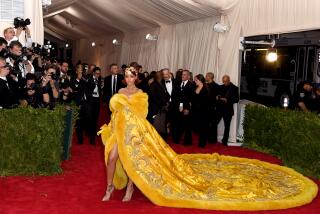A dynasty in dysfunction
In his twilight years, Sumner Redstone should be relaxed, fulfilled and enjoying the fruits of his labor.
From a hardscrabble upbringing in a working-class neighborhood in Boston, Redstone has amassed a personal fortune of about $8 billion, making him one of America’s richest men. The entertainment empire he built is among the world’s largest, with CBS, Paramount Pictures, Showtime, MTV, Comedy Central and Nickelodeon.
His wife of four years, Paula, is half his age and lives with him in a mansion, with two swimming pools, a tennis court and screening room, in a posh gated community off of Mullholland Drive. Redstone’s collection of exotic fish in a handful of tanks can be viewed from his favorite chair in the den, where he compulsively watches the stock ticker on CNBC.
But instead of contentment, Redstone, at 84, is entangled in a bitter public feud with his children and is estranged from practically everyone in his family but his wife, according to people who know him well but spoke on condition of anonymity for fear of offending him. Several of his relatives have sued him.
At the center of the dispute is National Amusements Inc., the holding company founded by Redstone’s father as a theater circuit that today controls two publicly traded companies: CBS Corp. and Viacom Inc.
One lawsuit threatens Redstone’s control of the media empire. Testimony and documents in that case, filed by Redstone’s nephew, provide an unprecedented glimpse into the lives of the extended family, including allegations of financial chicanery and personal betrayals worthy of a Charles Dickens novel. The lawsuit claims that Redstone cheated his two children and the nephew out of portions of their inheritances to secure control over the family empire.
Over the years, Redstone has earned a reputation as a ruthless businessman, cunning legal strategist and limelight-seeking control freak. A lawyer by training, he won both Paramount and its parent company, Viacom, in bitter takeover battles. He is famous for suing his partners and pushing out chief executives who threaten his power or lack his fixation with the stock price.
But his behavior in recent years has become erratic. Last summer, he publicly dismissed superstar Tom Cruise from Paramount without telling Viacom’s chief. Days later, he fired Viacom CEO Tom Freston, who had built Redstone’s global cable juggernaut and was seen by many as his heir apparent.
Rivals say Redstone has lost his fastball. A split of his empire into two publicly traded companies in January 2006 has been deemed faulty by many on Wall Street. Although CBS’ stock surged unexpectedly, Viacom’s has languished as consumers have turned to the Internet rather than to cable programming, leading to Freston’s ouster.
Redstone is showing signs of his age despite a passion for health shakes and antioxidants. Daily swims have replaced vigorous games of tennis. He shuffles feebly and no longer brags about taking Viagra.
That, perhaps, has brought the future of the family fortune into sharper relief for his relatives. Last year, his only son, Brent, 50, sued Redstone, accusing his father and sister, Shari, of freezing him out of the business. His stake in National Amusements was bought out this year in a settlement.
Now, Shari, 53, who just a year ago was anointed by her father as his heir apparent, is mulling over legal action. She and her father have been at war for months over succession, corporate governance issues and the future of the theater chain she runs. Shari is president of National Amusements and a vice chairwoman and director of CBS and Viacom. Her father is CEO of National Amusements and chairman of Viacom and CBS.
On Friday the father-daughter conflict became viciously public when Sumner, in a letter to Forbes magazine, disparaged Shari as having made “little or no contribution” to the entertainment empire he built.
Meanwhile, another family spat, now playing out in a Massachusetts court, potentially could be more costly to Redstone, threatening the mogul’s control of National Amusements.
Filed in November by Michael Redstone, Sumner’s nephew, and by the trustees of three trusts established decades ago by Sumner’s father, Mickey, the suit alleges that Sumner wrested control of National Amusements by secretly engineering a purchase of shares from the family trusts at low-ball prices in 1972 and 1984. The redemptions, Michael Redstone contends, cheated Sumner’s own children as well as his brother Edward’s children, and their heirs, of their rightful interests. Edward also is named as a defendant.
If Michael and his co-plaintiffs prevail, they would end up with a majority 54.5% ownership of National worth an estimated $4.36 billion, according to the complaint. Sumner would become a minority shareholder.
Edward Redstone did not return a phone call Friday. Sumner’s spokesman Carl Folta said Redstone would not discuss pending litigation.
But Sumner has previously dismissed the case as “baseless.” His attorneys have contended the transactions were completely above board and approved by trustees. They say the statutes of limitations have passed, although the plaintiffs contend the real nature of the transactions did not become known until recently, when pertinent financial documents were produced in two other lawsuits.
Massachusetts Superior Court Judge Allan vanGestel is pondering a motion from defense lawyers to throw the case out on grounds that the statute of limitations has passed. If he allows the case to proceed, a trial would begin in March, at the earliest.
The fight within the Redstone dynasty is not unusual in family businesses, said Barry S. Cain, managing director of the Family Business Center at Chicago accounting firm Blackman Kallick. He cited such other cases as the Pritzkers of Chicago, in which children are suing their father over alleged mismanagement.
“When it comes to issues of control, transition of ownership or succession of management, the largest companies down to the smallest all have issues,” said Cain, adding that a mere 10% of U.S. family businesses survive the third generation.
At the moment, the dispute between Shari and her father seems likely to wind up in litigation, say people close to the matter. Some say Shari is questioning whether her father may have engaged in self-dealing and used National Amusements funds for his own benefit.
In Shari, Sumner faces a formidable foe. Those who know her say Shari is every bit as tough, competitive and shrewd as her father.
“She’s Sumner in a skirt,” a former Viacom executive said.
According to people close to the talks, one outcome could see Shari exchanging her rights to automatically succeed her father at National Amusements, Viacom and CBS upon his death for control of the theater chain she runs and its 1,000 screens. She could leave the family business altogether. In a statement Friday, she said she “would consider” a sale of her 20% stake in National at the current market value of about $1.6 billion.
At the heart of the Redstone saga is the theater business founded in the 1930s by Mickey Redstone (born Max Rothstein), a former linoleum peddler, liquor wholesaler and nightclub operator. In 1959, when the business reached down the Eastern Seaboard, it was incorporated as National Amusements.
Mickey gave 200 of its 300 shares to Sumner and Edward with instructions that at least half were to be placed in a trust for their children. A decade later he placed his own shares in a trust for his four grandchildren.
Edward and Sumner were both executives at National, but court documents suggest that Edward believed he was frozen out by his father and brother. He seems to have considered his father a domineering, even terrifying, figure: When his mother injected herself into a 1972 family blowup, he wrote her: “I don’t mean to be unkind, [but] you are the result of receiving years of unbelievable cruelty from Dad.”
That dispute arose from Edward’s decision to quit National. Court papers suggest that his strained relationship with his father and Sumner was leading him to a physical and emotional breakdown. When he learned that Sumner had hired a new managing executive for National -- supposedly behind his back -- Edward exploded in a violent confrontation with his brother: “You shoved me and said you would like to throw me out the window,” Sumner recounted in a nine-page, single-spaced letter written in 1971 detailing their deteriorating relationship.
But Edward was pushed to the brink, according to court documents. “Under all the laws of God, there is no justification for Sumner’s and Dad’s activities,” he wrote his mother. “The immorality of their activities is almost beyond belief.... Historically, Dad and Sumner steamrolled over anyone they think they can.”
Mickey, taking Sumner’s side, wrote Edward back: “You obviously cannot cope with your problems.... You have tried professional help and it obviously hasn’t helped.”
In 1972, National agreed to pay Edward $5 million for a 27% stake. That included his shares and those held in trust for his two children, Michael and Ruth Ann. Michael contends in his suit that Edward kept the proceeds for himself.
That deal was only the prelude for what Michael and his co-plaintiffs contend was a greater fraud by Sumner: The 1984 repurchase of the grandchildren’s trust shares that had been put in place by Mickey.
By the early 1980s, Sumner had grown convinced that movie theaters were in deep trouble as cable TV encroached on their turf, and Home Box Office, the premier pay-TV channel, contemplated production. Theater attendance had stagnated.
Under Sumner’s guidance, National Amusements began to invest heavily in entertainment companies, including Viacom and Metro Goldwyn Mayer. He also moved to solidify his control of National by buying up shares belonging to the next generation.
This was made easier because Sumner was a trustee of the grandchildren’s trusts and sole trustee of trusts he had created with shares from his father for his own children. The role arguably placed him in a conflict of interest. Court documents indicate that he signed the 1984 transaction as both buyer and seller -- as president of National Amusements and as trustee for Mickey’s grandchildren.
The appraisal of the grandchildren’s stock was done in 1982 by Sam Rosen, Sumner’s personal accountant and the accountant for National. Michael and his co-plaintiffs allege that Rosen grossly undervalued the company and therefore the grandchildren’s holdings. The repurchase gave Sumner two-thirds of National’s shares and the trusts for Brent and Shari, the rest. Meanwhile, the trusts for Edward’s children and one for all four grandchildren -- accounting for a 45% stake in the company -- was bought out for $21.4 million, even though National’s real estate alone was worth more than $150 million.
Now the undisputed owner of National, Sumner embarked on the investment spree that would transform the company into a worldwide entertainment power. In 1987 he took over Viacom, and eventually added Paramount and CBS.
But none of this brought peace to the House of Redstone. Instead, there were more lawsuits, including one in 2004 that produced the financial documents that Michael’s suit claims Sumner and Edward had kept secret from their children for more than 20 years.
And what’s left of the Redstone family line? Mickey died in 1987, at age 85. Edward, who married his brother’s stockbroker, retired to Rancho Mirage.
His daughter Ruth Ann also died in 1987, after having dropped out of sight in the Far East. Her son Gabriel Adam died in 2004, at age 20, in a motorcycle accident in California.
For his part, Michael, after being rescued from a mental hospital by Sumner, served as an executive at National Amusements before leaving recently and filing suit against his uncle.
Brent, who has three children, followed in his father’s footsteps by becoming a lawyer. He and his wife, Annie, live on a sprawling ranch outside Denver.
Shari, divorced with two children, is now the only Redstone besides Sumner in a top executive position within the family business. And even that relationship now appears to be headed down the same road to the courthouse as so many previous Redstone family disputes.
claudia.eller@latimes.com
More to Read
The biggest entertainment stories
Get our big stories about Hollywood, film, television, music, arts, culture and more right in your inbox as soon as they publish.
You may occasionally receive promotional content from the Los Angeles Times.






